Officials continue to release results from the March 7 L.A. County election. With most of the votes counted, results show:
- Measure S -- a slow-growth measure that would have imposed a two-year moratorium on developments that require a General Plan amendment, zone change or increase in allowable height -- was defeated.
- Measure H, a county ballot measure that would raise the sales tax a quarter-cent to fund homeless services, is slightly over the 67% it needs to win approval.
- Mayor Eric Garcetti has been reelected.
- Most incumbents were reelected to the City Council, and two Los Angeles Unified School District Board races are going to a runoff.
Race tightens in L.A. City Council District 1 with vote count ongoing
Los Angeles City Councilman Gil Cedillo’s main challenger, bike activist Joe Bray-Ali, was at 38.1% in the county registrar-recorder’s most recent update on Tuesday. Some uncounted ballots remain.
After slow start, Measure H reaches two-thirds majority
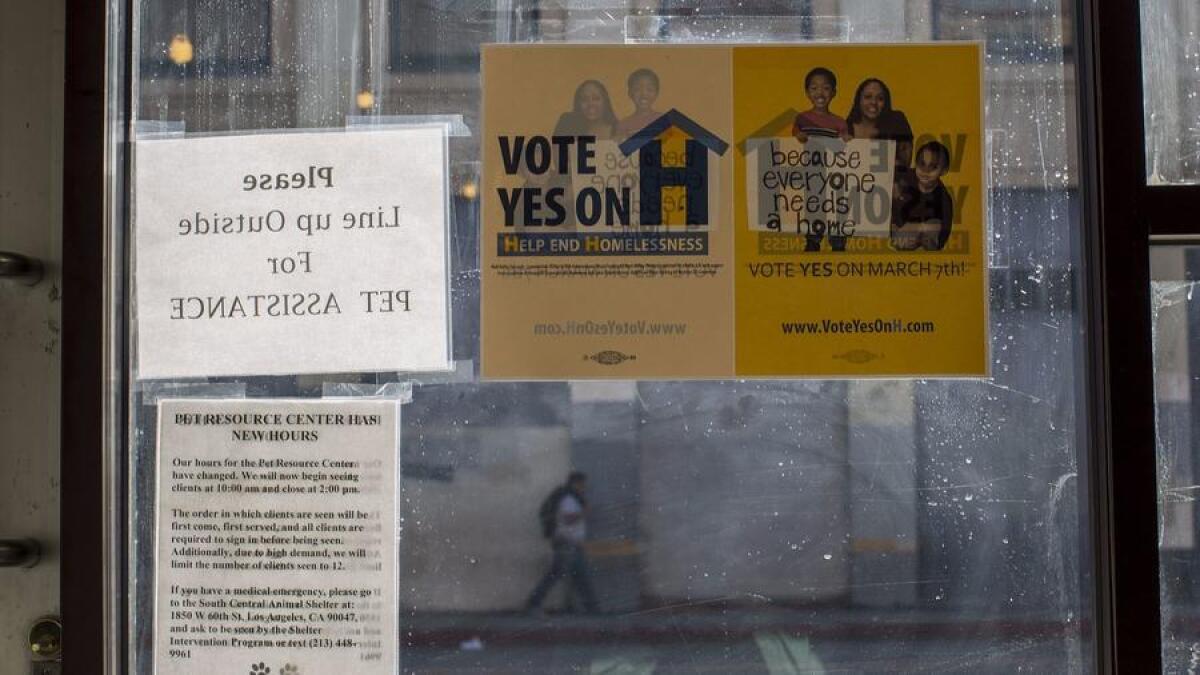
A quarter-cent sales tax increase in Los Angeles County to fund anti-homelessness measures appeared to earn the two-thirds majority needed for passage early Wednesday, with 100% of county precincts reporting.
Measure H would generate about $355 million annually for homeless programs over 10 years, backers say. The increase would raise the sales tax rate to 9% across most of Los Angeles County and up to 10% in a few communities.
It would be the second phase of a two-step fundraising strategy developed by the city and county. Los Angeles city voters approved a $1.2-billion bond measure in November to provide supplemental funding for 10,000 units of permanent housing with support services for the chronically homeless.
The new sales tax revenue would pay for services attached to those units and provide rental subsidies and services for thousands more units across the county.
Around 1:30 a.m. Wednesday, the L.A. County Registrar-Recorder reported that the yes vote stood at 67%, up from less than 63% early Tuesday night. It was just enough to squeak by the two-thirds majority needed for passage.
After dipping below 50%, Cedillo rebounds, appears to narrowly avoid runoff
Los Angeles City Councilman Gil Cedillo, the most vulnerable incumbent on the ballot Tuesday, appeared to have narrowly avoided a runoff by winning 51% of the vote.
“We took advantage of our advantages — experience matters — and we had faith,” Cedillo said after midnight Wednesday at his election night party at the Ebell Club in Highland Park.
All night long, as more votes were counted, Cedillo had been losing share, and most attendees had left the party believing that Cedillo was headed to a May runoff against his top challenger, bike activist Joe Bray-Ali.
The food was all eaten, the bar had run dry, the music shut down, Cedillo was huddled with staffers behind closed doors, and the last stragglers were headed for the exit when someone cried out: “51%! 51%!”
The county registrar-recorder’s website had just updated that Cedillo had won 50.98% of the vote, with 100% of the vote counted.
The supporters stormed the private room, circled Cedillo, started chanting “Si, se puede! Si, se puede!” and stomped on the wooden floors. Minutes later, he entered the main room to deliver an off-the-cuff victory speech.
“The people of this district and this city stood up for themselves, they manifested their own future, they made a statement to the city they weren’t going to buy some flippant, trendy, hippy, hipster … agenda,” Cedillo said, in an obvious dig at Bray-Ali. “But they were going to be traditional, they were going to acknowledge their realities, they were going to respect their circumstances and they were going to vote for themselves.”
Some late absentees and provisional ballots still need to be counted.
Koretz’s ‘concerns’ about a runoff are fading fast in District 5
Councilman Paul Koretz was cautiously optimistic late Tuesday as election returns showed him holding on to his seat by a wide margin.
With about 37% of precincts reporting, the incumbent had pulled in about 65% of the vote.
“I had some concerns,” he said about the prospect of having to take part in a runoff.
“I wasn’t sure if all the attacks on my character would wear off or not.”
He added that anti-incumbent fervor seemed to be in the air. Koretz dealt with a torrent of criticism from a well-funded challenger, Jesse Creed.
But in a district with some of what he called “the most educated voters,” Koretz said he was happy to see that people had faith in him.
Councilman Mike Bonin is cruising to victory on the Westside
Incumbent Mike Bonin fended off two campaign challengers and appears likely to avoid a runoff in City Council District 11.
Bonin faced two candidates who hit him hard on issues surrounding homelessness and development in his Westside district. With more than 20% of precincts reporting, he was well ahead early Wednesday, with 70% of the vote.
“I see [the results] as an affirmation of the work I’ve done and the progress we’ve made,” he said. “On little things that matter to neighborhoods like fixing roads and parks and bigger things that matter to the whole city like increasing the minimum wage.”
‘Optimistic’ Monica Rodriguez leads crowded field in Council District 7 race
Council District 7 candidate Monica Rodriguez began her election day at 5 a.m.
She only stopped knocking on doors when it became too dark for her to be able to read the addresses on her voter sheet. And she didn’t stop making calls until five minutes from when the polls closed at 8 p.m.
As of late Friday, Rodriguez was leading a packed field of 20 candidates vying for the only vacant council seat this election cycle. With just over 36% of precincts reporting, it appears she will face Karo Torossian in a mid-May runoff.
“We’re optimistic,” Rodriguez said about the results from inside a loud restaurant in Sylmar.
“We ran an aggressive grassroots campaign, and that hard work is paying off.”
Garcetti to Washington: ‘You will never divide this city, you will never divide its people.’
In a 15-minute address to supporters Tuesday night, Mayor Eric Garcetti declared victory in his reelection campaign, but said, “We have a lot more left to do.”
“While other people are talking about doing big things, Los Angeles, we are doing big things,” Garcetti said, citing the city’s push to house its homeless, his efforts to cut the business tax and L.A.’s support of immigrants.
Garcetti said it’s an “urgent moment” in the city and the nation’s history and it’s up for Los Angeles to show the world what “American values look like.”
He said no child should see his or her parent being taken away during a routine school drop-off, a reference to a recent incident in L.A.
“To those in Washington, to those who seek to divide us,” Garcetti said, “I say this tonight. You will never divide this city, you will never divide its people.
“We have to stop thinking about the most powerful man in this country and start thinking about the most vulnerable people in our city.”
Garcetti also said he “loved that people were exercising their 1st Amendment rights” by protesting during his victory party.
Councilman Gil Cedillo on early returns: ‘I like where we’re at’
Los Angeles City Councilman Gil Cedillo said he was feeling optimistic he would score an outright victory and avoid a runoff by winning more than 50% of the vote on Tuesday.
“I like where we’re at,” he said in an interview with The Times at his election-night party at the Ebell Club in Highland Park.
With 28% of the vote counted, Cedillo had 53% of the vote, while his closest rival — bike activist Joe Bray-Ali — had 33%. But if Bray-Ali and two lesser-known challengers can push Cedillo below 50%, the top two vote getters would face off in a May runoff election.
Cedillo, who served in the Legislature for 14 years before being elected to the council in 2013, pointed to his long history representing his district as the reason he would be victorious.
“We have experience and the public knows us. We didn’t just move into the district,” Cedillo said in a barely veiled criticism of Bray-Ali. “Our politics have been consistent for decades and that’s why we have a following.”
Yes on S campaign director: ‘We don’t like the looks of the early returns’
As early results were shown on the screen at the Yes on S campaign watch party, a collective sigh could be heard among the 100 or so supporters in the room.
Measure S, a controversial slow-growth ballot measure, was trailing 60% to 40%.
“We don’t like the looks of the early returns, but amazing things have happened in the course of politics of L.A.,” said Jill Stewart, campaign director for Yes on S.
Michael Weinstein, president of the AIDS Healthcare Foundation, which bankrolled the Yes on S effort, said it was the beginning of a larger fight against the entrenched powers in L.A. – specifically wealthy developers and City Hall.
“You had the entire establishment, in every dimension, using all the resources at their command to stop a citizen’s movement,” Weinstein said. “But that movement will not be stopped.”
He cited a number of small victories along the way. Mayor Eric Garcetti said last year that he would stop planning commissioners from meeting privately with real estate developers or other outside parties. Garcetti and several council members have also said they want the Planning Department to revise nearly three dozen “community plans” by 2026.
“It’s not a losing campaign,” Weinstein said. “This will go down in history as a campaign that didn’t win the vote that had the best results. Nobody in this campaign has defended the current system.”
Supporters upbeat as results roll in at Koretz’s election night party
Jeff Roth wore a full red jumpsuit as he mingled with guests at Councilman Paul Koretz’s election night party Tuesday night.
Roth had spent time at Koretz’s field office folding fliers and joked that his fliers were the reason why the councilman had more votes.
“I enjoy his personality,” Roth said of Koretz. “You always see him out there trying to do something, which I like.”
Koretz was leading early with about 66% of the vote and seven of the 115 precincts reporting.
Councilman David Ryu stopped by to congratulate his colleague as the councilman stared intently at a projection of the results on a wall.
It was also a family affair at the Farmer’s Daughter Hotel. Koretz’s daughter Rachel, 25, and wife, Gail, talked with staffers and thanked supporters as attendees enjoyed a buffet.
Gail said her husband had been making calls to his friends to ensure they voted, right up until the polls closed.
“That’s how Paul does it,” she said.
Garcetti: ‘Thank you for giving me the honor of being your mayor for another term’
Supporters gathered in Pico Union cheered Eric Garcetti as he took the stage Tuesday night to declare victory in L.A.’s race for mayor.
With about 4.2% of precincts reporting, Garcetti jumped to a huge early lead, pulling in about 80% of the vote.
“Let me say thank you, Los Angeles,” Garcetti told the crowd.
“Thank you for giving me the honor of being your mayor for another term.”
Garcetti was joined onstage by his wife, Amy Wakeland.
Hundreds of people — a cross section of city staffers, community leaders, politicians and lobbyists — gathered at the local headquarters of Laborers’ International Union of North America Local 300 for Garcetti’s election night party.
Protesters shouting “ICE out of L.A” interrupted Garcetti as he began speaking. The group was led out of the room and continued yelling and chanting as they exited the building.
At the Yes on S watch party, longtime residents air their frustration with development
Carole Miller showed up early for the Yes on S campaign watch party Tuesday night in Hollywood.
A Mid-Wilshire homeowner for nearly 30 years, Miller said she came to support Measure S because she has grown frustrated with projects built near her home that don’t conform to neighborhood zoning rules.
“When people like me bought their home, they didn’t think there would be a skyscraper next door to them or small-lot subdivisions because zoning was supposed to protect them,” Miller said. “City Council has been taking all this money from developers and everybody knows it.”
Early results showed Measure S trailing 59.4% to 40.6% with 4.2% of precincts reporting.
A collective groan could be heard among the 100 or so supporters who gathered at the party when the early results were announced. But campaign officials remained upbeat.
After early returns, Gil Cedillo’s supporters feeling confident he’ll avoid a runoff
Supporters of Los Angeles City Councilman Gil Cedillo, awaiting returns Tuesday night, were confident that the incumbent would avoid a runoff.
“It’s still early but the numbers look good,” said Tony Strickland, a Republican who served with Cedillo in the state Legislature, at Cedillo’s election night party at the Ebell Club in Highland Park.
In the vote-by-mail ballots, Cedillo won 57% of the vote, according to the Los Angeles County Registrar-Recorder. That’s the weakest of any incumbent council member on the ballot, but if he maintains such support among voters who cast ballots Tuesday, he will avoid a runoff election in May.
“Gil has an amazing ground army that believes in him, and he always does really well with election day voters,” Strickland said.
Get live election results from the L.A. primary
Protesters show up outside Garcetti’s election-night party, demanding he ‘stand up to Trump’
Dozens of protesters gathered outside Mayor Eric Garcetti’s election-night party on Tuesday night to push him to take a firmer stance on defending immigrants from deportation.
“Our friends and neighbors are under attack! What do we do?” a man in a bullhorn shouted as partygoers in suits and dresses filed into the gates of the Laborer’s International Union of North America Local 300 headquarters.
“Stand up fight back!” the crowd shouted back, later chanting, “Our city, not Garcetti!”
The protest was organized by the Los Angeles chapter of the Democratic Socialists of America, a leftist group that has seen its membership surge across the nation following President Trump’s election. Many of its members were supporters of U.S. Sen. Bernie Sanders’ insurgent Democratic candidacy for president, and now they have turned some of their energies to local issues.
On Tuesday’s ballot in Los Angeles, the group supported Measure H and opposed Measure S, and they want Garcetti to take a tougher stance against Trump’s agenda on immigration and to formally bar police from assisting ICE in deportations.
Protesters were especially dissatisfied with Garcetti’s remarks in an NPR interview when he said Los Angeles was not a “sanctuary city” and that he didn’t know what a sanctuary city is.
“I don’t want my neighbors to have to live in fear,” said Democratic Socialists member Anne Orchier, 30, who joined the group after Trump’s victory.
The protesters urged Garcetti to “stand up to Trump.”
“Sanctuary is our demand, Mayor Garcetti take a stand,” they chanted.
At one point, a guest walking into Garcetti’s party shouted back at the protesters, telling the group that the mayor was indeed standing up to President Trump.
The first set of results are in: Measure S trails, Garcetti takes a commanding lead
The Los Angeles County Registrar-Recorder released its first round of election results minutes after polls closed Tuesday.
They showed Measure S, a controversial slow-growth measure, falling behind early with 4.2% of precincts reporting; Measure H, a quarter-cent sales-tax increase to fund homeless services, had 61% of the vote, but needs about 67% to be approved.
Mayor Eric Garcetti also jumped out to a commanding early lead, garnering more than 80% of the vote.
Many other contests did not immediately list any early returns.
Overall, 142 of more than 2,500 precincts had reported.
Mayor Eric Garcetti wants another term — and a solid showing, just in case he runs for statewide office
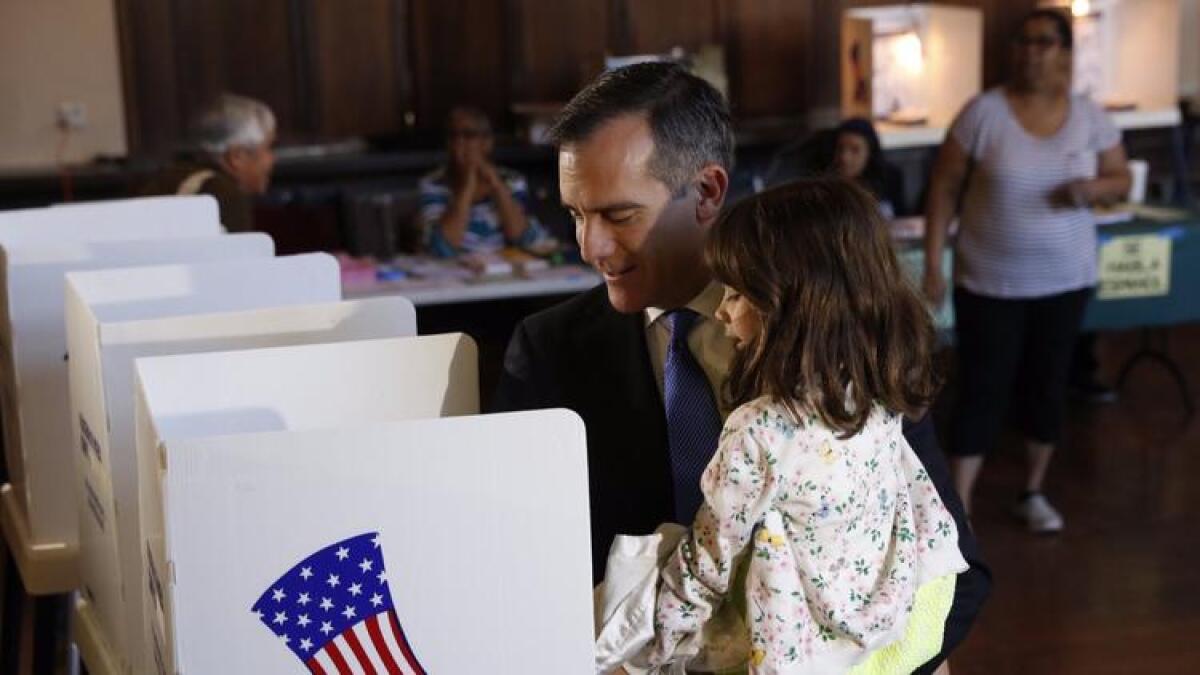
Mayor Eric Garcetti, facing 10 little-known opponents, was seeking a second term Tuesday in an election that also tested his clout as Los Angeles voters weighed a controversial anti-development measure that he fought to defeat.
Eight City Council seats were also at stake in Tuesday’s primary, as incumbents across the city sought to fend off potentially serious challengers.
In a season when Donald Trump’s tumultuous presidency has dominated politics worldwide, it has been hard for Garcetti and others on the L.A. ballot to capture the public’s attention.
The trickle of voters at city polling stations captured the city’s prevailing attitude toward the election: indifference.
“Four people in line at my polling place is four more people than I thought would be at my polling place, so that’s something,” USC graduate student Alex Amadeo wrote on Twitter.
L.A. County voter turnout at 11.45%
Voter turnout for Los Angeles’ elections was pushing up slightly this evening and stood at 11.45%.
How does this compare?
Turnout in L.A. peaked at 76% in a 1969 runoff, when Tom Bradley was running to become the city’s first black mayor. He lost but unseated Mayor Sam Yorty four years later in a rematch.
Turnout was big again when Richard Riordan was elected mayor in a 1993 runoff, reaching 45% in the aftermath of riots sparked by the acquittal of white police officers for the beating of Rodney King, an African American.
The record low of 18% in 2009 came when Mayor Antonio Villaraigosa won reelection after a somnolent race against largely unknown challengers.
Four years ago, even after a hard-fought and well-publicized race between Eric Garcetti and several well-known rivals, just 21% of registered voters cast ballots in the primary for mayor.
Still confused about Measure S? Here’s a last-minute primer
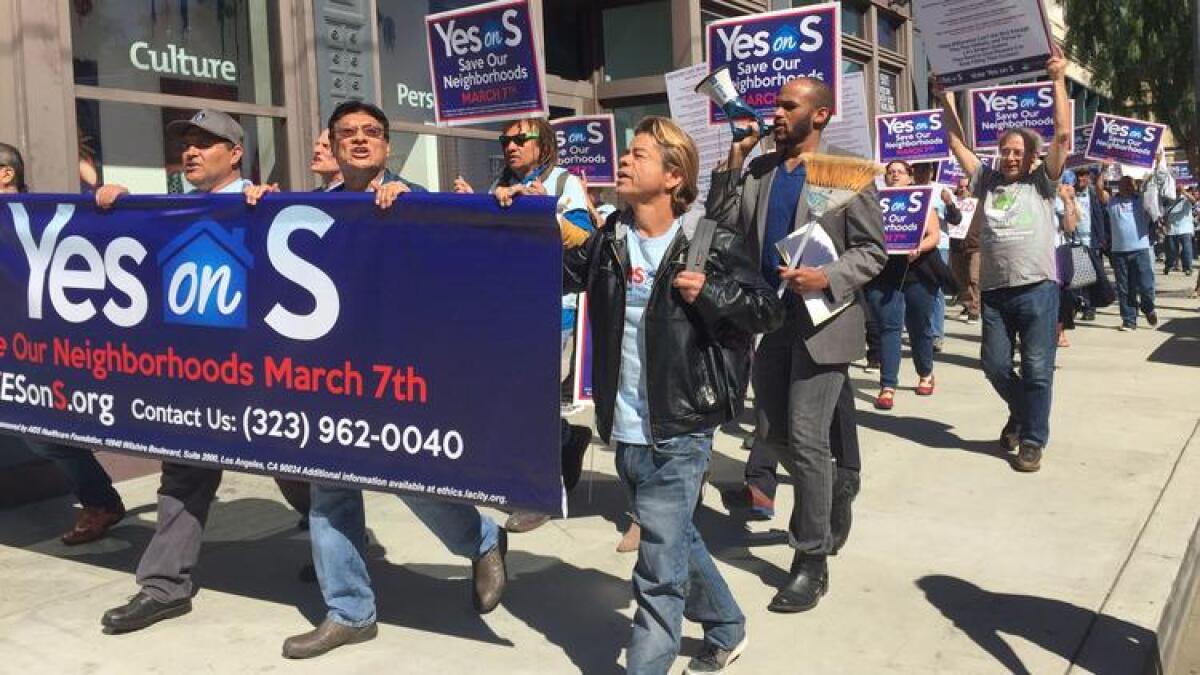
Los Angeles voters were deciding Tuesday whether to pass a bitterly contested ballot measure that would impose new restrictions on building apartment towers, shops and offices and halt some kinds of real estate development for up to two years.
Neighborhood activists have championed Measure S as a way to reform a broken planning process at City Hall, arguing that it would prevent out-of-scale projects that ramp up traffic and fuel gentrification.
Opponents — including labor unions, business groups and Mayor Eric Garcetti — have warned it could eliminate jobs and exacerbate the housing crisis, throwing the city into economic turmoil.
The divisive campaign has doubled as a referendum on urbanist dreams of a denser, taller Los Angeles, bemoaned by critics as the “Manhattanization” of L.A. If the measure passes, it will be a sharp rebuke to Garcetti and other political leaders who championed that vision in Hollywood and other Los Angeles neighborhoods.
More than $13 million was poured into the fight, funding billboards, television ads and an avalanche of campaign mailers.
Voters weigh sales tax bump to fight homelessness
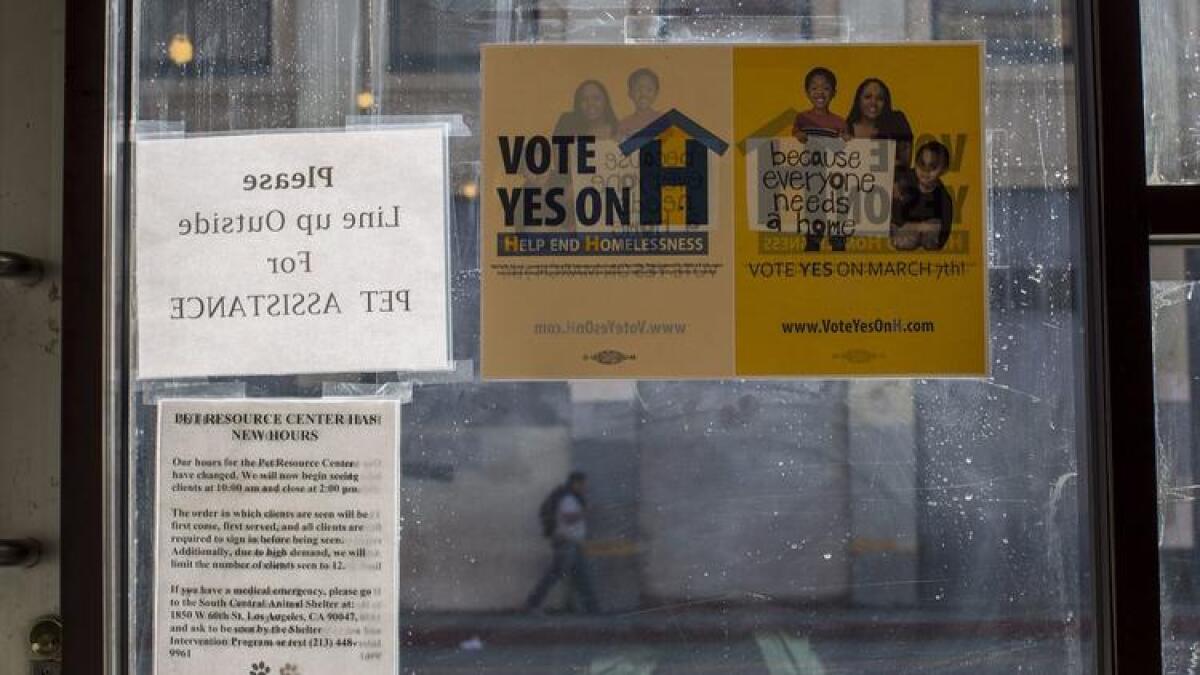
Los Angeles County voters are deciding whether to increase the sales tax by a quarter-cent to raise billions of dollars for housing and services that advocates say are needed to end the plight of thousands of homeless people living on the county’s streets.
Measure H, which requires a two-thirds majority for passage, would generate about $355 million annually for homeless programs over 10 years, backers say. The tax increase would raise the sales tax rate to 9% across most of Los Angeles County and up to 10% in a few communities.
It would be the second phase of a two-step fundraising strategy developed by the city and county. Los Angeles city voters approved a $1.2-billion bond measure in November to provide supplemental funding for 10,000 units of permanent housing with support services for the chronically homeless.
Polls close at 8 p.m.
Voters in L.A. County have about one more hour to cast their ballots. To find your polling place, go here.
After the polls close, The Times will have live results.
Civic duty
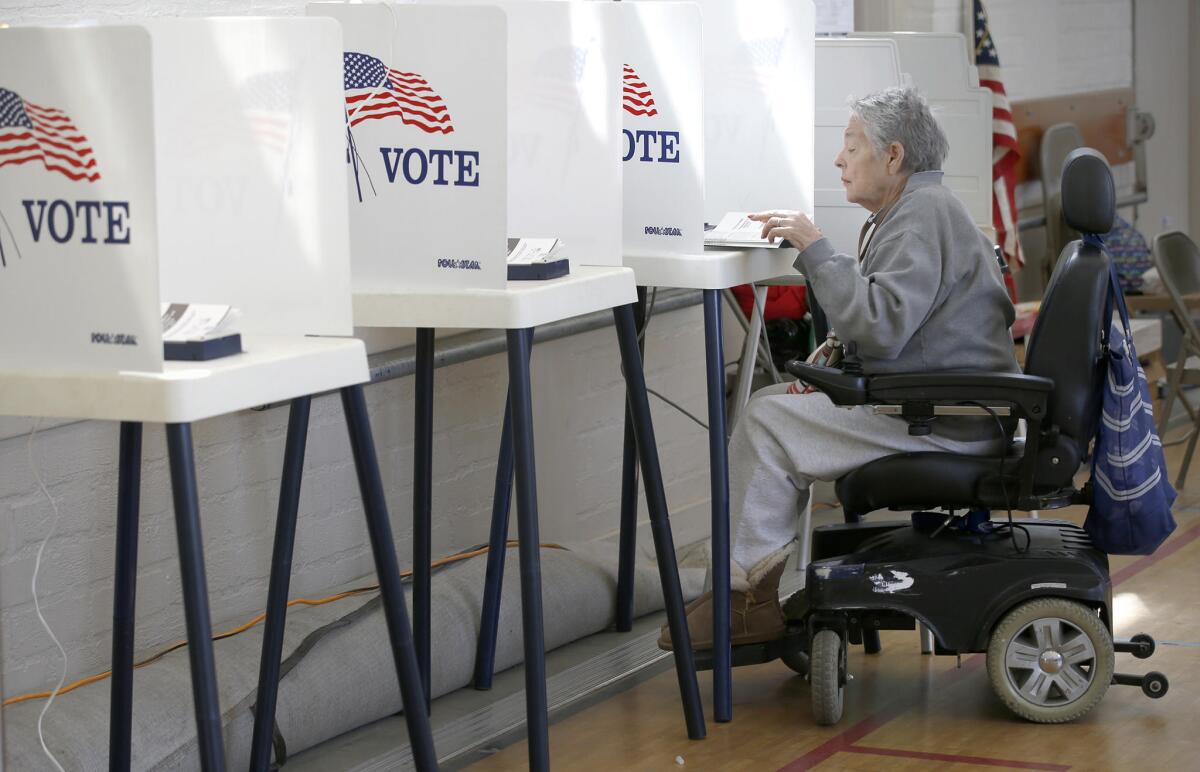
LAUSD school board President Steve Zimmer casts his ballot
‘There are so many addicts and mentally ill.... They need help’
For Maria Kobayashi, 70, the most important issue of the election was homelessness. But she doesn’t believe a development freeze is the way to do it.
“There are so many addicts and mentally ill. They don’t need housing, they need help,” Kobayashi said.
Zou Lu, 66, has lived in Chinatown and for years and watched with trepidation as more and more housing developments have sprung up in the neighborhood and the areas around it.
“When you walk around this place, you really don’t know what’s going to happen,” Lu said in Chinese. “We have to do something about [the crowding], it’s been so many years.”
But he voted against Measure S and freezing development. He agrees with the objectives of the Yes on S campaign, he said, but the freeze isn’t a good way to do it.
Lu isn’t bothered by Chinatown’s new housing developments. He understands why rich downtown workers want to live in the neighborhood, and they can afford the rent. That’s the way it’s always been since he came to this country, Lu said.
“In the U.S., if you have money, then you live better,” Le said.
Scenes from election day 2017 in Los Angeles
In Chinatown, voters debate growth, affordable housing and L.A.’s future
In Chinatown, where residents and business leaders have clashed over large housing projects like Blossom Plaza and the Jia Apartments housing complex, opinions on Measure S varied.
Some business owners have welcomed the wave of development and new restaurants to hit Chinatown because it brings foot traffic and spending dollars to the area. But many residents have decried the new businesses and development, saying they are not built with low-income residents in mind.
Eang Thai Ngou, a mute resident of Chinatown, wrote down his feelings.
“I am poor. Yes on S.”
Theo Henderson, 43, agreed. For him, the most important issue is the city’s treatment of the homeless. He lives around Chinatown and says homeless people are treated more like a public nuisance than human beings. Business improvement district employees regularly harass people, he said.
“We blame people for their misfortune. What happens when a guy has a job but he has to sleep in his car because he can’t afford housing?” Henderson asked.
He’s voting for Measure S because he believes it eventually could make housing more affordable in the city.
“We can’t keep relying on the benevolence of developers,” Henderson said.
Ted Gerike, 26, said the most important issue of the election was getting voters engaged. He hasn’t voted in many citywide elections before, but after Donald Trump’s presidential election, he decided it was important to vote whenever possible.
Gerike, a copywriter who moved to Chinatown four years ago, voted against Measure S. He supports the cause of affordable housing, believes developers should be held accountable and wants to stop gentrification, but he was turned off by what he called deceptive campaigning by the proponents of the measure.
“It’s in the guise of stopping gentrification, but it will help developers,” Gerike said.
Election day in L.A.
Mayor Eric Garcetti votes with the help of his daughter, Maya
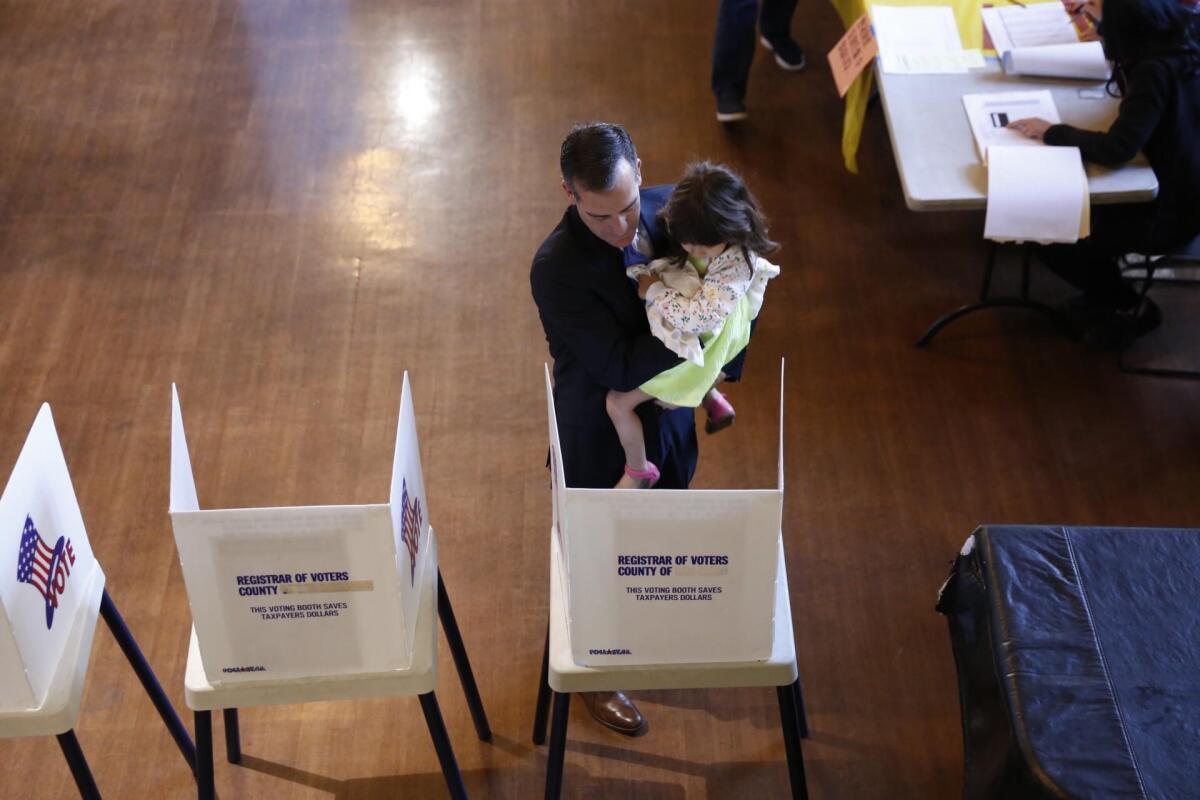
What if you held an election and 80% of voters didn’t care?
Apathy could be the big winner in today’s election. Recent history tells us most Angelenos won’t bother to cast a ballot. That means out of 2 million registered voters, a small sliver might decide key issues that affect all the city’s residents.
What’s at stake Tuesday? Some say Measure S could define L.A.’s character for years to come
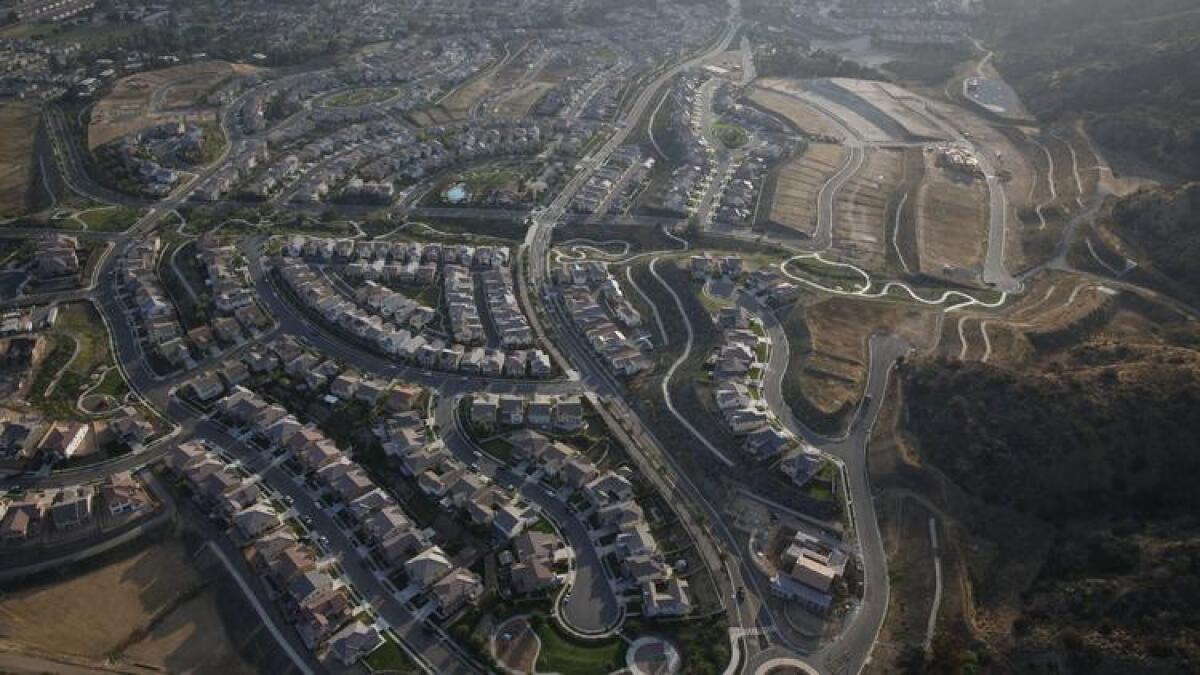
The single-family home has long been a signature of this region. But today that dream has grown cluttered.
Mid-rise apartments with adjacent retail attract renters tired of traffic and long commutes to downtowns where bikes compete with cars, brewpubs crowd sidewalks and dogs have their own parks. And developers, sensing another bonanza, are eager to build for this market, reshaping skylines with multistory towers.
There have been many efforts to slow the builders down. The latest, Measure S, calls for a pause, a two-year moratorium on projects that require Los Angeles City Council approval.
Only now the argument seems more urgent as the city, pushing against the San Gabriels and Pacific, nears what some see as logistical and environmental critical mass.
There is rhetoric on sides of the Measure S debate, but behind it is a trickier question: How will Southern Californians adapt as their cities become more crowded, traffic-clogged and expensive?
Angelenos approved a bond measure to help the homeless in November. Will they support Measure H on Tuesday?
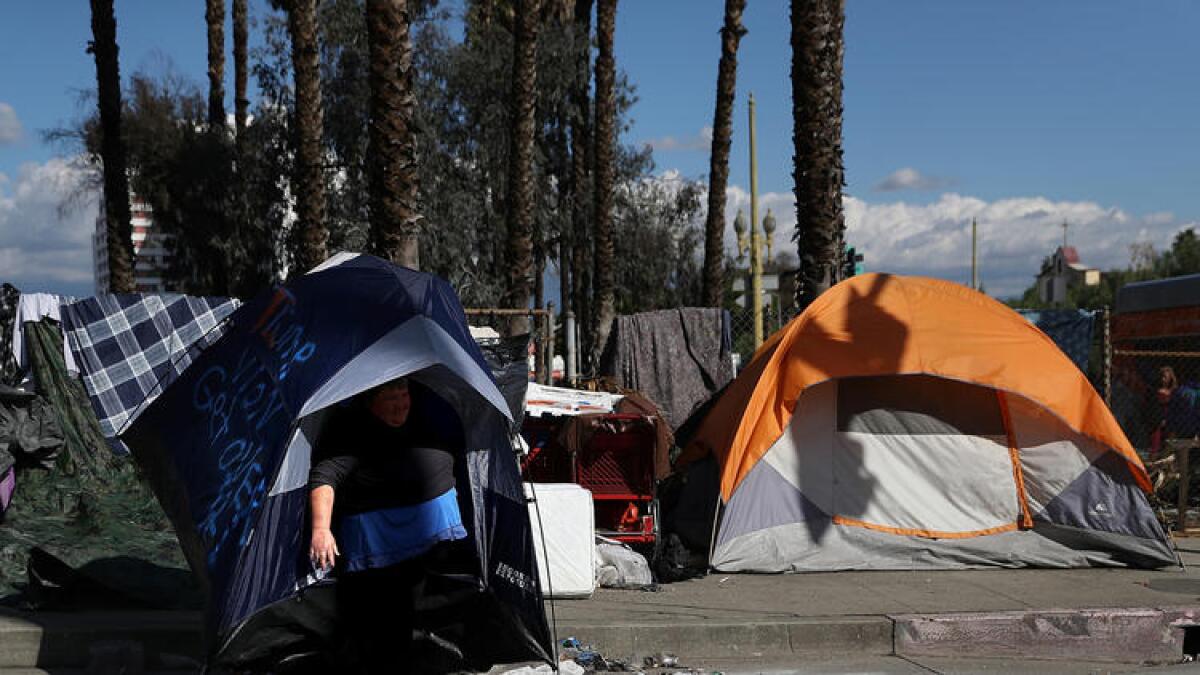
When Los Angeles voters overwhelmingly approved a bond measure in November to build apartments for the chronically homeless, long-frustrated advocates hailed the victory as a watershed in their efforts to provide permanent homes for thousands of people living on the city’s sidewalks and parkland.
But despite enthusiasm that couldn’t always be contained, proponents of Proposition HHH were mostly careful not to call it the ticket to ending homelessness. Rather, it was a down payment.
Now, voters across Los Angeles County are being asked to approve the balance — a quarter-cent sales tax to support a broad canvas of strategies. They include services for those living in thousands of new housing units, rental subsidies for thousands more across the county, hundreds of new outreach workers and short-term interventions to help those in crisis keep their homes.
Measure H on the March 7 ballot would produce a projected $3.55 billion for homeless programs over 10 years. The tax increase would raise the sales tax rate to 9% across most of Los Angeles County and up to 10% in a few communities. Because it would increase taxes, it requires a two-thirds majority to pass.
Eric Garcetti is widely expected to be reelected, but he’ll face a rising crime rate
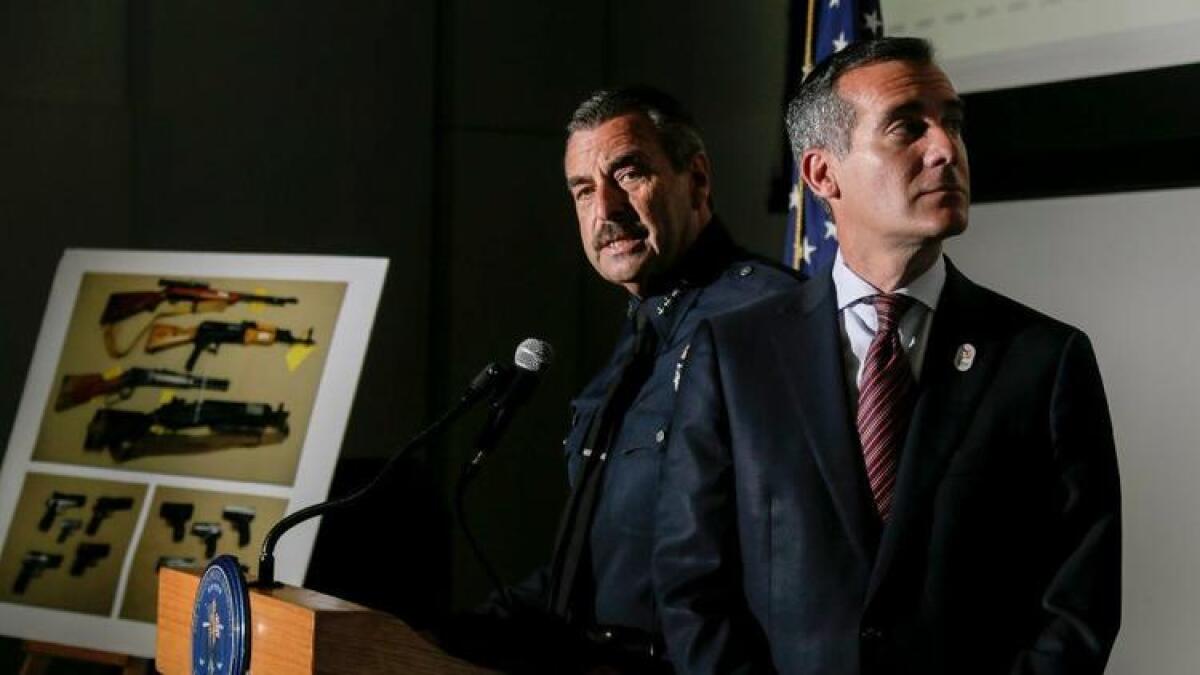
Mayor Eric Garcetti is up for reelection Tuesday, and he’s widely expected to cruise to victory.
But some say he’s simply been fortunate to have become mayor just as the recovery from the Great Recession was taking hold.
And Garcetti is also the first Los Angeles mayor faced with rising crime in more than a decade.
After 12 years of declines, violent crime climbed for the first time in 2014 — Garcetti’s first full year in office. The next year, both violent and property crime increased. Those numbers crept higher in 2016.
Now, some residents want to know how he plans to make the city safer.